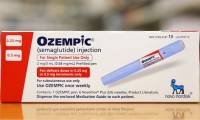-
Eli Lilly announces positive results for Retevmo in phase 3 lung cancer study
- Source: drugdu
- 201
- August 9, 2023
-
Artificial sweeteners linked to increased body fat, study finds
- Source: drugdu
- 263
- August 7, 2023
-
Novo Nordisk, Eli Lilly face injury lawsuit from user of popular GLP-1 medicines
- Source: drugdu
- 118
- August 7, 2023
-
Fructose identified as central conduit to obesity
- Source: drugdu
- 124
- August 3, 2023
-
FibroGen CEO Conterno, Who Scrapped Post-Lilly Plans Over Roxadustat Hype, Resigns After Launch Setbacks
- Source: drugdu
- 252
- July 27, 2023
-
Kodiak Sciences Scraps Late-Stage Vision Loss Biologic
- Source: drugdu
- 120
- July 26, 2023
-
Daily Prune Consumption Has Promising Effects on Biomarkers Related to Cardiovascular Health
- Source: drugdu
- 244
- July 26, 2023
-
Researchers Identify Genes that Directly Influence What We Eat
- Source: drugdu
- 104
- July 24, 2023
-
Black Patients with ICDs Have Higher Rate of Post-Implant Cardiac Events and Risk of Death
- Source: drugdu
- 129
- July 19, 2023
-
Obesity Drug Maker Versanis to Be Bought by Eli Lilly for $1.9 Billion
- Source: drugdu
- 110
- July 18, 2023
your submission has already been received.
OK
Subscribe
Please enter a valid Email address!
Submit
The most relevant industry news & insight will be sent to you every two weeks.













